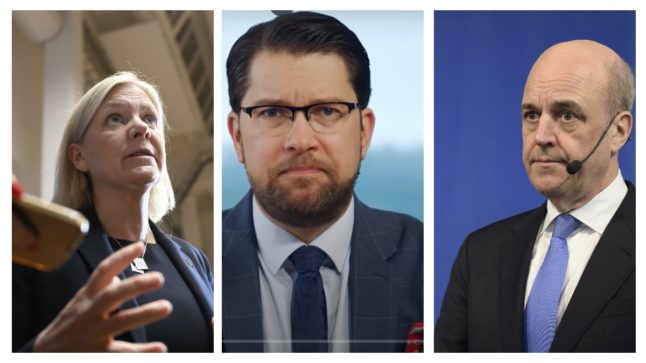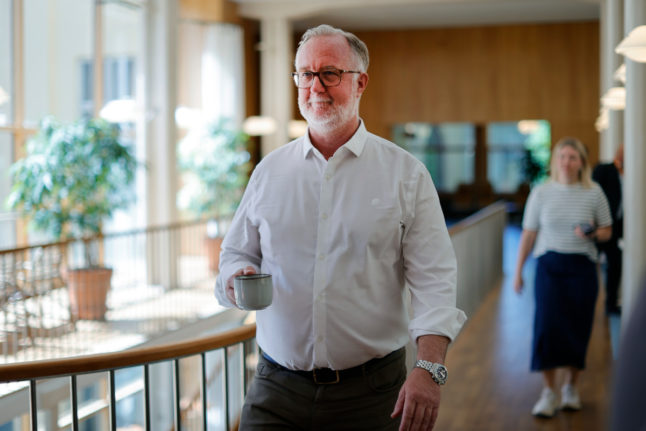When news broke last Monday evening of a terror attack on Swedish football fans, the leader of the opposition, Magdalena Andersson, put out a statement at 10pm that sounded very much like she thought she was still prime minister.
“It is important that all Swedes present in Brussels listen to the recommendations of the Belgian authorities,” she wrote in a statement announcing the “terrible news”, which was sent both to Sweden’s public broadcaster SVT and posted on X.
On Wednesday, the leader of the far-right Sweden Democrats, Jimmie Åkesson, put out a “speech to the nation” on his party’s SDRiks YouTube channel in which he seemed to suffer the same delusion.
Flanked by a Swedish flag, and wearing a suit, tie and pocket handkerchief, he addressed “Sweden, Swedes and friends of Sweden at heart”, painting a grim picture of how Sweden had gone since his childhood from being “one of the world’s safest countries” to “somewhere which more resembles the Wild West”.
Then this Monday, Fredrik Reinfeldt, who led Sweden between 2006 and 2014, seemed to be seeking to remind people what it was like when he was in charge.
In an interview with the Dagens Nyheter newspaper published on Monday, Reinfeldt, now chair of the Swedish Football Association, celebrated Sweden’s football shirt as a symbol that united everyone regardless of ethnic background or religion.
“We have over 500,000 Muslims in Sweden. This is their shirt too,” he said, striking a tone that will have reminded one of the more stirring speeches of his premiership.
“What happened in Brussels was that a lone attacker challenged our right to wear this shirt. To then wear the shirt is a way of saying, ‘we’re not going to surrender’,” he said. “We must stand up for the shirt. It’s a symbol of our support and our joy at being Swedes. I refuse to accept that we close down our open society and surrender to those who use violence.”
It has long been clear that the Social Democrat opposition is seeking to “out-government” the government, responding to events and putting out policy proposals rapidly so that the government always looks slow-footed. The Social Democrats can then win over voters on competence, rather than by directly challenging the government parties’ messages on immigration, crime and the environment.
To take one of many examples, the Social Democrats on September 28th called for the military to help combat gang crime, only for the government to announce the same policy a day later.
The night of the Brussels attack was perhaps the most striking example yet. It wasn’t until midnight that Sweden’s foreign minister, Tobias Billström, came out with his own statement. Sweden’s actual prime minister, Ulf Kristersson, was nowhere to be seen until a press conference at 11am the next day.
For the Social Democrats, this is a tried and tested strategy.
It is new, however, for the Sweden Democrats to play the same game and seek to out-PM the PM.
Kristersson gave a prime ministerial “speech to the nation” at the end of September after there were three deadly gang attacks in the space of 24 hours, so the Moderates may have felt the Brussels attack didn’t warrant another one.
The statement he did give, at the start of the press conference, arguably had a confused message.
It started by echoing the extraordinary speech Jens Stoltenberg, Nato’s current Secretary General who himself is a former Norwegian prime minister, made after twin terror attacks in Norway in 2011, in which he declared that “our response is more democracy, more openness, and more humanity.”
The terrorist, Kristersson said similarly in his statement, could not change Sweden’s open society. He then called for a host of measures, from stricter border controls to greater police powers, that would do exactly that.
Whatever the merits of the statement, Åkesson clearly spotted an opening.
“There’s no other way of interpreting this than that he is saying: ‘The country is in crisis and I can do what none of you others can manage: Bring order back to Sweden,” pointed out Arne Larsson in an analysis in the Göteborgs-Posten newspaper.
To those opposed to the far-right party, Åkesson’s speech, with its picture of Sweden in crisis and harsh message for immigrants, will only have underlined the reasons why they don’t want him anywhere near the PM’s office. But his own supporters were jubilant. With 428,773 views in less than five days it is already the sixth most-watched video the party has ever released and X was full of supporters calling on Sweden’s state broadcaster SVT to broadcast it.
On Saturday, Kristersson sought to rouse the party faithful, declaring to the collected local politicians that “our party has won the battle on the really big issues of our time”, listing issue after issue — Nato, crime, the EU, nuclear power, taxation, foreign policy — where the party’s views had won out.
Judging by the public response from Moderate supporters, the speech seems to have done the job.
Holding speeches is after all supposed to be Kristersson’s strong point.
He is a more skillful speaker by far than Andersson, his Social Democrat predecessor, and certainly than Stefan Löfven, prime minister for the seven years before that.
And yet somehow his rivals sense a gap to be filled.



 Please whitelist us to continue reading.
Please whitelist us to continue reading.
Member comments